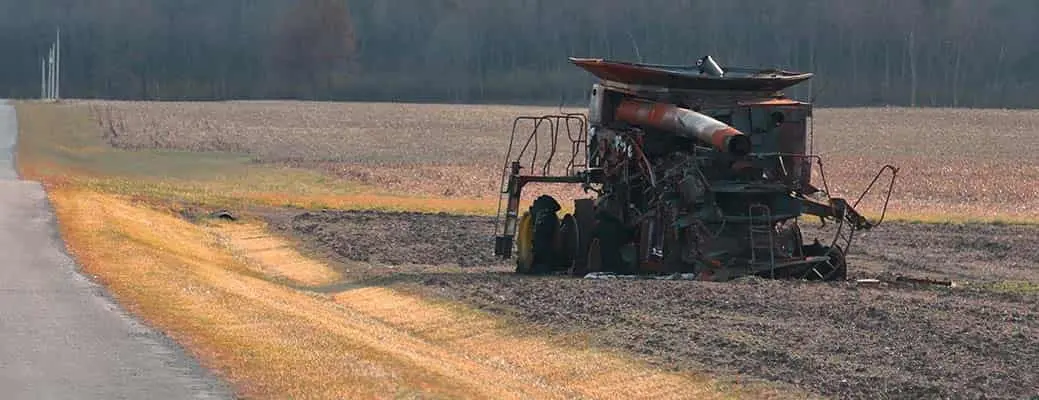3 Steps to Take After a Combine or Tractor Fire


Imagining your tractor or combine going up in flames probably makes your stomach churn. No wonder: your farm equipment is vital to the success of your operation — and it’s a significant investment, too, representing hard work that you’ve poured into your farm.
Yet combine and tractor fires cause more than $20 million in property losses annually, according to researchers at the University of Minnesota Extension Service. That’s a lot of money, and it doesn’t even include lost time and revenue from crops damaged by fires.
Every farmer knows that there’s no way to guarantee that you’ll never have an accident on your ranch. But there are measures you can take — like keeping an appropriate tractor fire extinguisher around — that can help mitigate risk and keep you safer. Here are some guidelines for preventing tractor fires and other equipment hazards as well as what to do to cut down on damage and recoup losses if one occurs.
Before each harvest, you likely follow a routine that includes inspecting your farm equipment. You want to ensure everything is running in tip-top shape before you head out to the fields. That’s smart: it’s a good idea to start your harvest season with clean and well-maintained equipment. Remember that most machinery fires begin in the engine area, so it’s a good idea to pay special attention to the engine compartment of your tractor or combine to ensure there is no material that might be prone to ignite and burn.
Then, throughout the harvest season, be sure to inspect your machinery routinely — look for oil or fuel leaks, broken pieces, buildup of debris and other flammable material. Keep your machinery as clean as possible and blow off dry chaff, leaves and crop residue from the equipment to prevent vehicle fires. And don’t forget other ways to minimize risk in your ag operation.
A few common-sense guidelines can go a long way in keeping you and your equipment safe. Make sure heat sources (such as your equipment’s exhaust system) are in good condition and don’t come in contact with any flammable material. Don’t park the combine in a shed or shop when it is hot, and wait at least 15 minutes before re-fueling a hot combine. Inspect fuel lines and wipe up any fuel or oil spills as they occur.
Of course, while there are preventative steps you can take to help reduce your risk, you can’t eliminate all risks. Being prepared is important when it comes to accidents that could dramatically impact the success of your operation. But even preparation and prevention can’t eliminate all risks, especially with dry conditions that harvest season brings. A tractor fire extinguisher is a key safety tool in an emergency, so it’s important to be sure to have at least one fully charged fire extinguisher attached to each piece of machinery. Check the extinguishers on a consistent basis to be sure they are working properly. For best results, consider using a dry chemical extinguisher, as they are effective at putting out fires caused by fuel, oil and electrical components.
Despite your best efforts, accidents can occur. Here’s what to do if a fire breaks out.
Your safety is the top priority. If a tractor fire breaks out on machinery you’re operating, turn off the engine, get out and call emergency responders. Make sure that others are far away from the fire as well. If the fire is small and it is safe to do so, use the fire extinguisher according to the manufacturer’s instructions to put out the flames.
Once the smoke has cleared, you’ll want to call your insurance company to report the incident and file a claim. Don’t be afraid to ask questions along the way about steps you should take, other people you should speak with and your risks and liabilities.
Pictures may be helpful for the claims process. When it’s safe to do so, take photos from all angles of the tractor so that you can share them with your agent. Having visual documentation will greatly aid in getting your business back up and running as soon as possible.
Your time in the field is valuable, and the last thing you want to worry about is your insurance. With Replacement Cost Coverage for Farm Machinery coverage, you’re adding a layer of protection should your machinery be damaged beyond reasonable repair due to fire, collision or other covered occurrence. If the unit is determined to be a total loss, we’ll help pay to replace it¹ with a similar same make and model, without depreciation! Ask a Farm Bureau agent today how we can help you protect your farm or ranch operation.